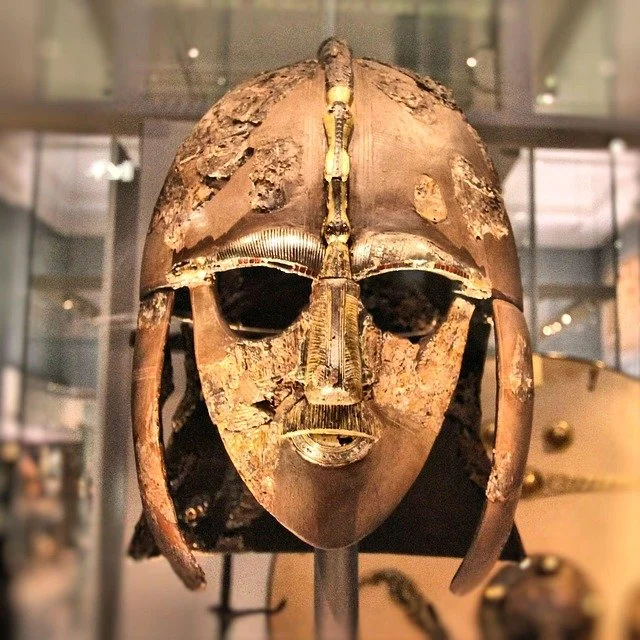Dapplings and stipplings - the stuff of Magic
August is the changing time… after the golden-wheat certainty of high summer there is change in the warm breeze. Nature’s patterns are flowing inexoriably onwards; it is liminal time and that is when - not viewed head-on but glimpsed tantalisingly in our peripheral vision - we may glimpse wonders. This praise poem expresses something of this beautifully: why not read it out loud?
Pied Beauty
Glory be to God for dappled things –
For skies of couple-colour as a brinded cow;
For rose-moles all in stipple upon trout that swim;
Fresh-firecoal chestnut-falls; finches’ wings
Landscape plotted and pieced – fold, fallow, and plough;
And áll trádes, their gear and tackle and trim.
All things counter, original, spare, strange;
Whatever is fickle, freckled (who knows how?)
With swift, slow; sweet, sour; adazzle, dim;
He fathers-forth whose beauty is past change:
Praise him.
Gerard Manley Hopkins (1844—1889)
Druids are very shy of the G word: it seems inextricably linked to gender and as we make our story with the creative expression of the universe, that’s not helpful. But substituting ‘Spirit’ for ‘God’ in this poem is all it takes to reveal how Druidic it is.
Gerard Manley Hopkins was, like the earlier Thomas Traherne (c. 1636) a mystical Christian and in tune with a Druidic world view. That statement would probably have horrified him, but the incontrovertible fact is that we share a way of perceiving living spirit in everything through observation of, and fascination with, the natural world. This poem speaks to me – and I suspect, most Druids - as it celebrates the mystery, changeability, mutability of life forms. I too love all things - ‘counter, original, spare, strange;
Whatever is fickle, freckled (who knows how?)’
– for when does the camouflage of the badgers’ stripes emerge from dappled shadow of the night time forest into a separate living creature? When do bats over the water morph from moving black mist into tiny leathery dinosaurs? And that’s just when we’re quite calm and open to nature’s wonder. Crank up the tension and our imaginations really take flight – ‘How easy is a bush supposed a bear?’ sums it up perfectly (trust Shakespeare!) in the fairy-led midnight forest caperings of A Midsummer Night’s Dream.
What perfect adaptation - would you have spotted Wol??
Thinking of the ancient Druids’ heyday around the Iron Age is for me inextricably linked with their artistic culture and the metamorphoses implicit in that era’s fabulous metal work – animals shift fluidly into each other in belt buckles and horse artefacts; horses evolve into dragons, men’s heads are held in the mouths of snakes: why are the eyebrow terminals on a helmet actually boars, and the eyebrows wings? Is this a man’s face or a bird or dragon in flight? Taliesin himself has three births – from a woman, a Goddess and a Salmon weir so it’s not suprising that he says ‘And it is not known whether my body is flesh or fish’.
Hint: the moustache is the dragon’s tail…
Moving forward to the mediaeval texts of the Mabinogi there are numerous examples of magical metamorphoses, perhaps from ancient oral tradition: punishment transformations of species and gender from men into deer, swine and wolves resulting in hybrid progeny: a man defeated by the threat of a badger metamorphosis; a solar hero transmuted into an eagle; a woman changed into a mouse. I find echoes of all this fluidity in my love of dappled things. How can we not look at the infinite mutability, diversity and changing design of the most prosaic of creatures and not see evidence of a supremely inventive creative energy in such beauty? Who could look at a chrysalis and imagine the butterfly, or the acorn and see the mature oak? Such change is way beyond our poor imaginations.
As a Christian relative said of that cloud pattern resembling fish skin, ‘The mackerel’s back proclaims the mackerel sky; it is irrefutable evidence of God.’
Sky or scales? A hint about connection from a joined-up cosmos?
One literary device we have inherited from the earliest poems written in the UK that I like to continue is the Praise Poem. Pied Beauty is a wonderful example, though ancient Celts and modern Druids are likely to express their praise in a less hierarchical context than Hopkins did. When I make spontaneous poems to the land as I walk, I’m not praising a creator God, for that implies an intelligence that I can understand and therefore is on a par with my own. To reiterate (for it is vitally important) the creative impulse of the universe I hold in awe is far too great to understand; beyond my wildest imaginings. So I simply praise the thing that I see in all its tender exquisite beauty; and the spirit behind it that shapes its manifestation. My poem is its witness, and maybe that is justification enough for my existence. I’ll end with a most ancient example. One day a poet, dead well over one thousand years ago, walked in liminal space and found their inspiration in the beauty of the sea shore. It’s simplicity and direct relational nature transports us into a timeless space.
Beautiful to me is the rolling wave
White whisper on the wet shingle
Of the shore, shell crushed to sand
By sweep of gleaming glassy curve
Creaming and curling, endlessly breaking
On the beach..
And now, over to us.
We are inheritors of a living tradition, and if we feel we have no bardic skills, it behoves us to carry forward the impetus of love and gratitude for beauty in our noticing. It’s the discipline that enriches both us and the world we praise. It often leads to a whispered phrase, a thank you to life, and the breath of a response from the sentient world.
I think it’s wonderful.
Liminal, transient, mutable.. author has fun whilst betwixt and between… /|\






